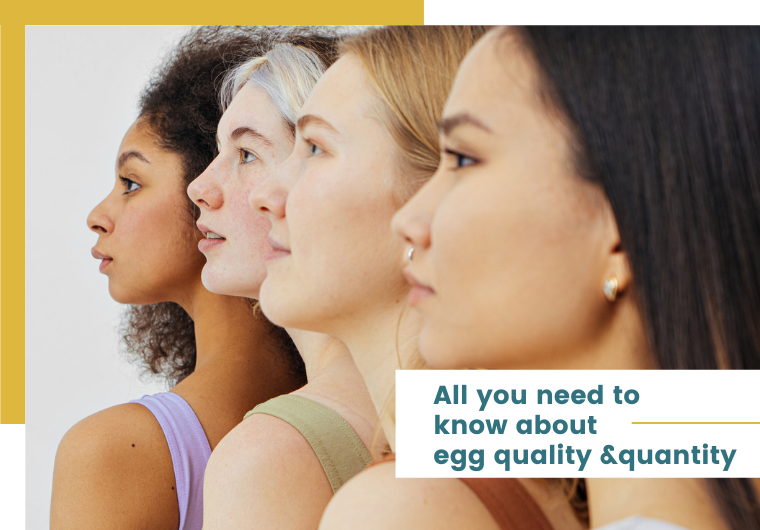Women’s Health Week is upon us and is the biggest week in Australia focusing on good health and wellbeing for those who identify as women. Here at Chill, we want to take positive action by providing you with more information that may help you understand your future fertility needs and how to make an informed decision in this regard.
Unlike those who continually produce sperm throughout their lifetime, we are born with a finite supply of eggs (around 1–2 million) – a stockpile that gradually decreases over time. Understanding how this reserve of eggs slowly runs out as you age can help you make decisions that protect your future chances of having a baby.
What is ovarian reserve?
‘Ovarian reserve’ refers to the amount of remaining eggs held in your ovaries with reproductive potential. In other words, it refers to both the quality and quantity of your eggs.
It is important to know that both egg count and egg quality affect your fertility. While they both matter for different reasons, when it comes to your fertility health it’s important you have a plentiful supply of healthy eggs.
It all adds up.
A bit about egg quantity
The number of eggs held in the ovaries is known as ‘egg quantity’. Those assigned female at birth are born with 1-2 million eggs, however, this number steadily decreases with age from puberty. As you age, your egg quantity decreases gradually, accelerating from the mid-thirties onwards. There is no specific age where egg quantity suddenly drops off the face of the earth, the process, while similar for all people with eggs, differs from person to person. Eventually, menopause occurs when the egg count dances around the 1000 mark and menstrual cycles begin to come and go irregularly. While the reason is not always clear, some people may have a lower egg quantity at birth, and others may lose their eggs at an accelerated rate.
Commonly, it’s mistaken that those with high egg counts are extremely fertile. This is not the case. Studies have made it evident that egg quantity is not directly correlated with the natural conception of a pregnancy. Generally, in a natural menstrual cycle where hormonal birth control isn’t taken, a single egg is ovulated. Because of this, the chance of falling pregnant is not reliant on numbers or egg reserve, but rather the quality of the egg being ovulated.
A bit about egg quality
Unlike our counterparts who can regenerate sperm and procreate late into their lives, unfortunately, egg owners are unable to do the same. As we age, so do our eggs. Not only does the quality continually lower with age, but the decline in quality enhances the risk of ovulating an egg that is genetically abnormal or with an imbalance in DNA. If an abnormal egg is fertilised there is a risk that the embryo will form with the incorrect number of chromosomes which can often lead to developmental delays. These delays may cause the embryo to fail to thrive and grow, while others won’t implant at all, impeding the ability to conceive.
Can I improve my egg quality?
Age plays a major role in the quality of eggs, although it is not the only determining factor. The quality of developing eggs and their reaction to natural or external hormonal stimulation can also be influenced by stress, environmental pollutants, poor diet, inflammation, drug misuse, excessive smoking, hormonal disparity, etc. Furthermore, cigarette smoking, aggressive treatments (such as radiation for cancer), or ovarian surgery such as endometriosis, can even cause Diminished Ovarian Reserve (DOR) which is a condition in which the ovary loses its typical reproductive function, impacting fertility.
And while there are things you can do to help you reduce the deterioration of your eggs, there is no evidence that specific diets, herbal treatments, acupuncture, yoga, massage, or retiring to a Tibetan monastery can improve fertility and egg quality.
In other words, you can maintain how healthy your eggs are, but you may not be able to improve their quality.
So… What’s the best way to preserve your egg quality?
The best way to preserve your egg quality
Egg freezing. Whether you are in your early 20s or approaching your 40s, elective egg freezing provides you with options for your future fertility, by preserving the quality of your eggs at the time you freeze them. Amazing, right?
With the age of eggs being a top determining factor of female fertility, we are here to help you take charge of your reproductive future while knowing your eggs are carefully preserved and stowed for when you’re prepared to start a new chapter in your life.
If you think you might want to have a family of your own someday but aren’t ready now, freezing your eggs allows you to keep your options open.
Get started
Chill now offers appointments by video and/or phone. We are here to help you in any way we can during your fertility journey. Please ask our friendly staff about our flexible payment plan options to get you started. If you’re ready to take your fertility into your own hands book your appointment today.
Please note that Chill Egg Freeze is an inclusive brand that proudly supports all sexually and gender diverse people who wish to use our services.



